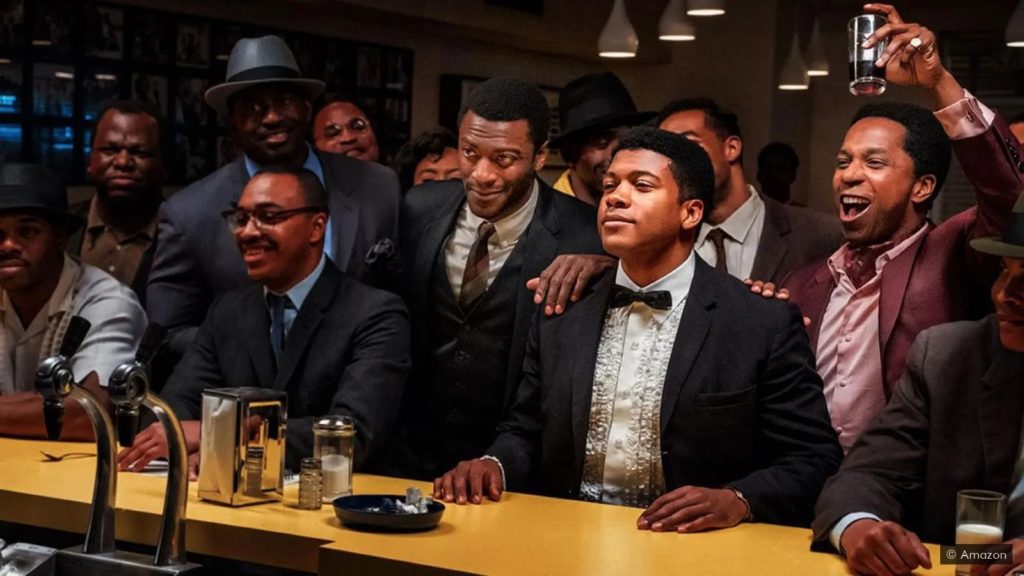
One Night in Miami has just premiered at the Venice Film Festival. Nicholas Barber gives his verdict on Regina King’s directorial debut.
Kemp Powers’ play One Night in Miami has such a perfect premise that when he hit upon it, he must have hurtled towards his notebook or his laptop, desperate to get it on the page and the stage before anyone else. The big idea was to imagine what happened on 25 February 1964, when the 22-year-old Cassius Clay defeated Sonny Liston in Florida to become the world heavyweight boxing champion, and then met up with three close friends, Malcolm X, Sam Cooke and Jim Brown. All four men were black American icons. All four were at turning points in their lives. Two of them would be murdered within the next year.
Now the film of the play – directed by Regina King (best known for acting in Ray, If Beale Street Could Talk, and the Watchmen TV series) – has premiered at the Venice Film Festival. Eli Goree plays Cassius Clay, the newly minted champ, who is planning to announce his conversion to Islam and his adoption of the name Muhammad Ali. Kingsley Ben-Adir (a British actor, not that you’d know it) is Malcolm X, the activist who feels trapped between the FBI agents who are tailing him and the Nation of Islam group he is preparing to leave. Leslie Odom (Aaron Burr in Hamilton) plays the suave Mr Soul, Sam Cooke, as well as providing all of Cooke’s angelic singing. And Aldis Hodge is imposing and dignified as Jim Brown, the football star who is thinking of relaunching himself as a Hollywood action hero.
The film does its subjects a disservice by not allowing them a little more zest and irreverence
It won’t take long for viewers to twig that One Night in Miami started life as a play. In the opening boxing matches, Goree captures Clay’s balletic grace, superhuman speed and showboating cockiness. And the best scene in the film is another new one near the beginning, in which Brown visits the plantation home of a white Georgia grandee (Beau Bridges). “Our families have always looked after each other,” oozes Brown’s host – and you have to ask what form that looking after might have taken. But for the central hour or more, the four men are cooped up in Malcolm’s motel room, with one interlude on the roof for a change of scenery. Cooke and Brown are in the mood for wine, women and song, but Malcolm has other ideas. They will have a serious discussion of their contributions to African-American civil rights. And if they really want to celebrate, there are two packs of ice cream in the freezer, both of them vanilla.
Quite apart from the single-location set-up, One Night in Miami is undeniably stagey, from the freshly ironed costumes to the slow and steady camerawork to the on-the-nose dialogue. The script (adapted by Powers from his play) is essentially a series of unsubtle debates that tick off the issues in turn rather than flowing like a natural conversation. It’s hard to believe that the evening was quite as sober, in all senses of the word, as the symposium presented here. And the film does its subjects a disservice by not allowing them a little more zest and irreverence. We all know how funny Ali could be in press conferences: surely in private with his friends, on one of the best nights of his life, he would have come out with a few more zingers than Powers gives him.
Luckily, the topics under discussion, and the men discussing them, are all worth hearing. Should Cooke move away from romantic ballads and towards Dylan-esque protest anthems? Should Brown be in westerns if his character is killed off halfway through? And the film adds some emotional intensity to its academic interest later on, as Malcolm’s criticisms of his friends’ perceived lack of militancy grow into angry attacks, and faultlines criss-cross his initially cool, calm, spiritual demeanour. Clay, Cooke and Browne are largely happy with themselves and their choices; it is Malcolm who is shaken with nerves about the challenges and dangers ahead of him, even as he insists that his chosen path is the only correct one. The other characters don’t go on such a tumultuous journey, and the other actors don’t get to show the range and depth that the excellent Ben-Adir does.
As unbalanced as it might be, One Night in Miami is a well-acted history lesson and a sincere tribute to the men, their friendship, and their inspiring cultural importance. It’s just that King and Powers’ treatment of that outstanding premise hasn’t quite made the leap from stage play to big-screen film; it has landed in TV-movie territory instead.

World Opinions Culture – bbc Culture




 World Opinions Débats De Société, Questions, Opinions et Tribunes.. La Voix Des Sans-Voix | Alternative Média
World Opinions Débats De Société, Questions, Opinions et Tribunes.. La Voix Des Sans-Voix | Alternative Média





Hurrah, that’s what I was exploring for, what a stuff!
present here at this webpage, thanks admin of this web page. https://vanzari-parbrize.ro/parbrize/parbrize-isuzu.html